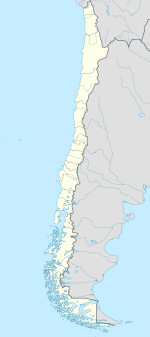|
Cunco, Chile
Cunco is a Chilean commune and city in Cautín Province, Araucanía Region. The town is located 60 km southeast of the city of Temuco and 77 km west of Icalma International Pass. The major geographical features of this commune are the Allipén River and the Colico Lake. According to Friar Ernesto Wilhelm de Moesbach Cunco is etymologically derived from the Mapuche language's word for "dark red" (cun) "water" (co) meaning water with volcanic ash or silt.[3] HistoryCunco was founded by Colonel Gregorio Urrutia in 1883 as a frontier fort, between the marshes Cunco and Nahuelcura, and close to a tributary to the Allipén river. The arrival of the railroad at the beginning of the twentieth century accelerated its urban development. It changed legal status to "commune" on 20 August 1918. In 1918 Cunco was the ending point of the first flight by an airplane across the Andes, when Luis Candelaria flew from Zapala, Argentina, on April 13.[4] DemographicsAccording to the 2002 census of the National Statistics Institute, Cunco spans an area of 1,906.5 km2 (736 sq mi) and has 18,703 inhabitants (9,203 men and 9,500 women). Of these, 8,806 (47.1%) lived in urban areas and 9,897 (52.9%) in rural areas. The population grew by 2% (364 persons) between the 1992 and 2002 censuses.[2] AdministrationAs a commune, Cunco is a third-level administrative division of Chile administered by a communal council, headed by an alcalde who is directly elected every four years. The 2008-2012 alcalde is Patricio Mittersteiner Garrido. The communal council has the following members:[1]
Within the electoral divisions of Chile, Zapallar belongs to the 52nd electoral district and 15th senatorial constituency. References
External links
Information related to Cunco, Chile |
||||||||||||||||||||||||||||||||||||||||||||||||||||||



